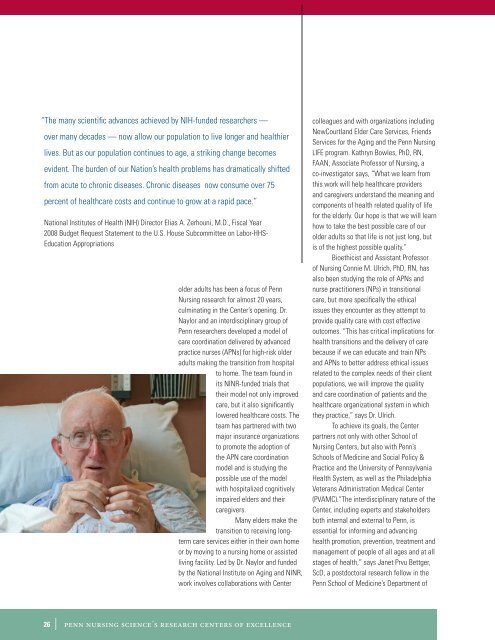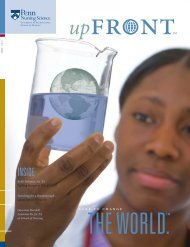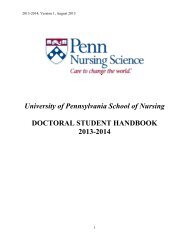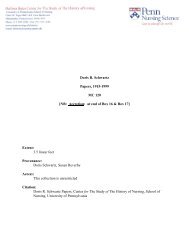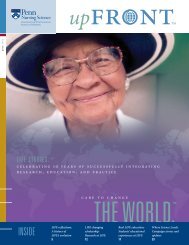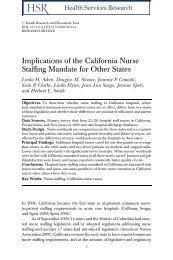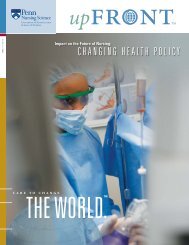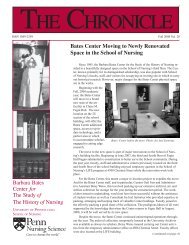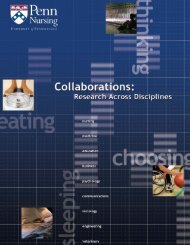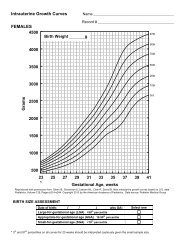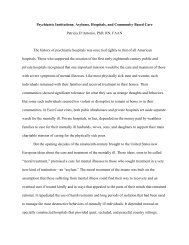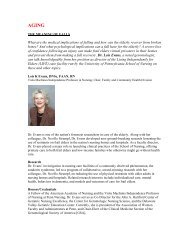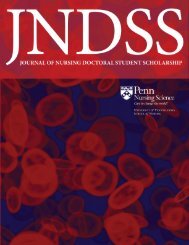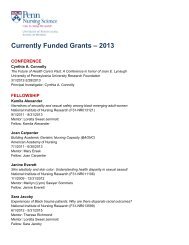Research Centers - University of Pennsylvania School of Nursing
Research Centers - University of Pennsylvania School of Nursing
Research Centers - University of Pennsylvania School of Nursing
Create successful ePaper yourself
Turn your PDF publications into a flip-book with our unique Google optimized e-Paper software.
“The many scientific advances achieved by NIH-funded researchers —<br />
over many decades — now allow our population to live longer and healthier<br />
lives. But as our population continues to age, a striking change becomes<br />
evident. The burden <strong>of</strong> our Nation’s health problems has dramatically shifted<br />
from acute to chronic diseases. Chronic diseases now consume over 75<br />
percent <strong>of</strong> healthcare costs and continue to grow at a rapid pace.”<br />
National Institutes <strong>of</strong> Health (NIH) Director Elias A. Zerhouni, M.D., Fiscal Year<br />
2008 Budget Request Statement to the U.S. House Subcommittee on Labor-HHS-<br />
Education Appropriations<br />
older adults has been a focus <strong>of</strong> Penn<br />
<strong>Nursing</strong> research for almost 20 years,<br />
culminating in the Center’s opening. Dr.<br />
Naylor and an interdisciplinary group <strong>of</strong><br />
Penn researchers developed a model <strong>of</strong><br />
care coordination delivered by advanced<br />
practice nurses (APNs) for high-risk older<br />
adults making the transition from hospital<br />
to home. The team found in<br />
its NINR-funded trials that<br />
their model not only improved<br />
care, but it also significantly<br />
lowered healthcare costs. The<br />
team has partnered with two<br />
major insurance organizations<br />
to promote the adoption <strong>of</strong><br />
the APN care coordination<br />
model and is studying the<br />
possible use <strong>of</strong> the model<br />
with hospitalized cognitively<br />
impaired elders and their<br />
caregivers.<br />
Many elders make the<br />
transition to receiving longterm<br />
care services either in their own home<br />
or by moving to a nursing home or assisted<br />
living facility. Led by Dr. Naylor and funded<br />
by the National Institute on Aging and NINR,<br />
work involves collaborations with Center<br />
colleagues and with organizations including<br />
NewCourtland Elder Care Services, Friends<br />
Services for the Aging and the Penn <strong>Nursing</strong><br />
LIFE program. Kathryn Bowles, PhD, RN,<br />
FAAN, Associate Pr<strong>of</strong>essor <strong>of</strong> <strong>Nursing</strong>, a<br />
co-investigator says, “What we learn from<br />
this work will help healthcare providers<br />
and caregivers understand the meaning and<br />
components <strong>of</strong> health related quality <strong>of</strong> life<br />
for the elderly. Our hope is that we will learn<br />
how to take the best possible care <strong>of</strong> our<br />
older adults so that life is not just long, but<br />
is <strong>of</strong> the highest possible quality.”<br />
Bioethicist and Assistant Pr<strong>of</strong>essor<br />
<strong>of</strong> <strong>Nursing</strong> Connie M. Ulrich, PhD, RN, has<br />
also been studying the role <strong>of</strong> APNs and<br />
nurse practitioners (NPs) in transitional<br />
care, but more specifically the ethical<br />
issues they encounter as they attempt to<br />
provide quality care with cost effective<br />
outcomes. “This has critical implications for<br />
health transitions and the delivery <strong>of</strong> care<br />
because if we can educate and train NPs<br />
and APNs to better address ethical issues<br />
related to the complex needs <strong>of</strong> their client<br />
populations, we will improve the quality<br />
and care coordination <strong>of</strong> patients and the<br />
healthcare organizational system in which<br />
they practice,” says Dr. Ulrich.<br />
To achieve its goals, the Center<br />
partners not only with other <strong>School</strong> <strong>of</strong><br />
<strong>Nursing</strong> <strong>Centers</strong>, but also with Penn’s<br />
<strong>School</strong>s <strong>of</strong> Medicine and Social Policy &<br />
Practice and the <strong>University</strong> <strong>of</strong> <strong>Pennsylvania</strong><br />
Health System, as well as the Philadelphia<br />
Veterans Administration Medical Center<br />
(PVAMC).“The interdisciplinary nature <strong>of</strong> the<br />
Center, including experts and stakeholders<br />
both internal and external to Penn, is<br />
essential for informing and advancing<br />
health promotion, prevention, treatment and<br />
management <strong>of</strong> people <strong>of</strong> all ages and at all<br />
stages <strong>of</strong> health,” says Janet Prvu Bettger,<br />
ScD, a postdoctoral research fellow in the<br />
Penn <strong>School</strong> <strong>of</strong> Medicine’s Department <strong>of</strong><br />
26 | care penn to nursing change science´s the world research centers <strong>of</strong> excellence


